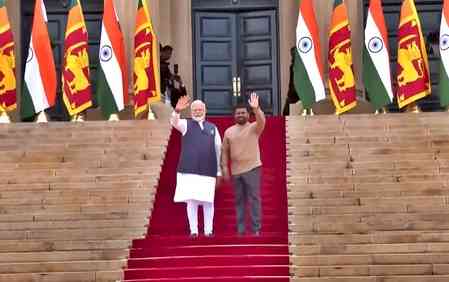China-Taliban ties: Keeping terrorism on the back burner?

New Delhi/Kabul: Chinas latest bonhomie with the Taliban, which has so far refused to de-link itself from terrorist groups like the Al Qaeda, flies in the face of its claims to be part of the global counter-terrorism movement.
By describing the Taliban as a "pivotal military and political force" in Afghanistan but remaining silent about the latter's association with terror, amid reports that members of several Pakistan-based terror groups are at present fighting on its side against the Afghan national forces, China has sent a disturbing message to the world about its political ethics.
Their new relationship exposes China's twin, contrasting objectives of befriending the regressive, Islamist organisation that has links with terror groups to extend its expansionist plan to Afghanistan while using the same terror plank to continue the brutal Sinicisation of the Xinjiang region which is home to millions of Uyghur Muslims.
What is more significant is the United States literally turning a blind eye to the relationship between the two that has the potential to endanger the South Asian region. The media has reported Secretary of State Anthony Blinken as saying: "Neighbouring countries of Afghanistan have an interest in the region, but no one has an interest in the region falling into an enduring civil war or the hands of the Taliban. If China and other countries are working on that interest, then it's a positive thing."
The questionable development has its roots in the recent meeting in Tianjin, China between top Chinese officials and a delegation of the Taliban. The state media showed China's foreign minister Wang Yi greeting deputy leader of Taliban Mullah Abdul Ghani Baradar. Wang posed for photographs with all the nine members of the Taliban delegation.
Wang's ministry quoted him as telling the delegation that it should play "an important role in the process of peaceful reconciliation and reconstruction" of Afghanistan. The Chinese have been in touch with the Taliban off and on, the last time in 2019, but never in such a public manner.
Their meeting is beneficial to both of them, at least for the time being. The support of China gives breathing space to the Taliban from global criticism its attempt to capture the country by force. It also shows how political equations have changed since the United States drove the Taliban out of power two decades ago and how even powerful countries like China treat the Taliban with kid's gloves.
The Taliban gets much more than China out of their new-found relationship. Since the US officially declared its intention to withdraw from Afghanistan by August 31, the Taliban has embarked on a public relations trip to gain sympathisers to its cause. Its delegations have since visited Russia, Iran and Turkeminstan apart from China. The friendly reception to them in the four regional countries bestows on them the kind of legitimacy they desperately seek. The rest of the world sees them as insurgents and any softening in that stand towards the Taliban can be attributed to their selfish interests in the region.
The meeting with Wang is the biggest coup for the Taliban leadership. They told him everything that he and President Xi Jinping wanted to hear: That they respect China, they are happy to invite Chinese investments in Afghanistan, they would look for a peaceful resolution of the Afghan situation once they acquire control, that they would not allow terrorist groups inimical to China to seek bases in Afghanistan.
China sympathisers in the west are not alarmed at the Taliban-China ties. They seriously argue that China wants nothing from this relationship other than an end to the Afghan conflict. The New York Times quoted a former US State department official and UN adviser on Afghanistan, Barnett R. Rubin, as saying of the Tianjin meeting: "It is an effort to use China's influence to persuade the Taliban not to seek a military victory but to negotiate seriously for an inclusive political settlement."
Such comments tend to show China in a more sympathetic and earnest light while drawing attention away from its selfish interests. China's usual hullabaloo about Islamist terrorists slipping into Xinjiang and provoking unrest among the Uyghur Muslims flies in the face of two things. One, China and Afghanistan share a short border of 47 kilometres at the end of an inaccessible, mountainous region called the Wakhan Corridor. Such is the security presence and surveillance in Xinjiang that no Uyghur can move unnoticed, let alone plan an insurrection. The East Turkestan Islamic Movement that China declares as a terrorist organisation is no longer in the terrorist list of the United States. China used the presence of this organisation to justify the detention of over a million Uyghurs in so-called re-education camps.
Secondly, China had always wanted to play a prominent role in South Asian affairs in its capacity as the self-claimed Asian giant. It could never convince India about this. Try as it may, it could also not play a larger role in Afghanistan because of the huge American presence. It sees an opportunity now with the Americans leaving. If the Taliban does not object to China at one point of time having a mediatory role between the insurgents and the Afghan government, China would realise its dream.
Thirdly, and this is significant, China eyes Afghanistan as the latest partner in its Belt and Road Initiative project. Not wanting to displease the US, Afghanistan did not take any interest in the BRI. However, things are changed now and China believes it is backing the right horse in the country. It wants Afghanistan's approval for the Peshawar-Kabul motorable high way to connect Pakistan and Afghanistan as also connect Xinjiang with Afghanistan through the Wakhan Corridor and from there to Pakistan and Central Asia.
Last but not the least, China would want to protect its current investments in Afghanistan, worth billions of dollars, mostly to develop the Aynak copper mine. It may have its sights also on billions worth rare-earth metals that sit deep within the Afghan mountains.
For the last two decades, the American presence in Afghanistan, though criticised often in the region, was actually a stabilising factor in many ways. At least on the terror front it kept things quiet in Afghanistan as most of the terror outfits shifted bases to neighbouring Pakistan. With the American departure there is a big question mark on how future stability can be ensured and who will keep the terror groups at bay. The Taliban insurgents aiming to grab power and China showing interest in the country for its own reasons pays the foundation for a future spell of confusion.


 IANS
IANS 








